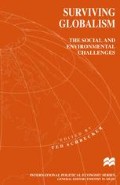Abstract
The Montreal Protocol on Substances that Deplete the Ozone Layer1 is an example of ‘surviving globalism’ in action. The Protocol is a ‘landmark step in the international environmental regime’2 and a model for future multilateral agreements. It illustrates that the international community can move with relative speed to act on a complex problem. To do so, the international community had to overcome: a series of complex debates over development strategies and the respective responsibilities of the industrialized and developing world; the power of industrial groups’ concerns; and a widespread lack of political will to give environmental protection a high priority.3
Access this chapter
Tax calculation will be finalised at checkout
Purchases are for personal use only
Preview
Unable to display preview. Download preview PDF.
Notes
Anne Gallagher, ‘The “New” Montreal Protocol and the Future of International Law For Protection of the Global Environment’, Houston Journal of International Law, 14 (1991): 267–9;
R.E. Benedick and R. Pronove, ‘Atmosphere and Outer Space’ in Peter H. Sand (ed.), The Effectiveness of Environmental Agreements (Cambridge: Grotius, 1992): 137–8;
James Maxwell and Sanford Weiner, ‘Green Consciousness or Dollar Diplomacy?’ International Environmental Affairs, 5, 1 (1993): 19–41;
Elizabeth Barratt-Brown, ‘Building a Monitoring and Compliance Regime Under the Montreal Protocol’, Yale Journal of International Law, 16 (1991): 519–30.
Dale Bryk, ‘The Montreal Protocol and Recent Developments to Protect the Ozone Layer’, Harvard Environmental Law Review, 15 (1991): 275, 176 and 297;
Joel Mintz, ‘Comment: Progress Toward a Healthy Sky: An Assessment of the London Amendments to the Montreal Protocol on Substances that Deplete the Ozone Layer’, Yale Journal of International Law, 16 (1991): 571–82.
M. Tolba, O. El-Kholy et al. (eds), The World Environment 1972–1992 (London: United Nations Environment Program and Chapman and Hall, 1992): 33;
Robin Round, ‘At the Crossroads — The Multilateral Fund of the Montreal Protocol’ (Amsterdam: Friends of the Earth International, 1992): 5.
Mario Molina and F. Sherry Rowland, ‘Stratospheric Sink for Chloro-fluoromethanes: Chlorine Atom Catalyzed Destruction of Ozone’, Nature, 249, 5460 (1974): 10–12; How CFCs Eat up the Ozone Layer (Ottawa: Environment Canada, 1993).
Adil Najam, ‘An Environmental Negotiation Strategy for the South’, International Environmental Affairs, 1, 3 (Summer 1995): 249–87.
World Commission on Environment and Development (WCED), Our Common Future (New York: Oxford University Press, 1987): 43.
International Indigenous Women’s Caucus, World Women’s Congress for a Healthy Planet, Women’s Action Agenda (New York: Women’s Environment and Development Organization (WEDO), Nov. 1991).
United Nations Conference on Environment and Development (hereinafter UNCED), Rio de Janeiro, Agenda 21 (New York: United Nations, 1992).
R.E. Benedick, Ozone Diplomacy: New Directions for Safeguarding the Planet (Cambridge, MA: Harvard University Press, 1991); Bryk, ‘The Montreal Protocol’: 276–7.
Raimon Ranikkar, Ideas, transcript (Ottawa: Canadian Broadcasting Corporation, November/December 1992).
Ed Diener, ‘Psychological and Subjective Indicators of Well-being’, unpublished paper for the [Canadian] National Round Table on the Environment and the Economy; David Myers and Ed Diener, ‘Who is Happy?’, Psychological Science, 6, 1 (1995): 10–19.
Catherine MacKinnon, Toward a Feminist Theory of the State (Cambridge, MA: Harvard University Press, 1989): 248. This test was created for individual women’s equality rights cases: ‘Does a practice participate in the subordination of women to men, or is it no part of it?’ She adds that whether statutes are sex-specific or gender-neutral would not be as important as whether they work to end or reinforce male supremacy.
Rajni Kothari, ‘Human Rights as a North-South Issue’, Bulletin of Peace Proposals, 11, 4 (1980): 331–8;
Vandana Shiva, ‘A Common Future or Environmental Apartheid’ The Observer of Business and Politics (20 February 1992).
Schoenbaum, ‘Agora, Trade and the Environment’, American Journal of International Law, 86, 4 (October 1992): 700. To classical theorists like Schoenbaum, free trade is the ultimate value and nothing, including the environment, should interfere with it.
WCED, Our Common Future :3; Morris Miller, Debt and the Environment: Converging Crises (New York: United Nations, 1991), in which a former Canadian Executive Director of the World Bank comments that there is now a widespread realization that the prevailing systemic arrangements are inimical to environmental objectives and action). Robert Housman, ‘A Kantian Approach to Trade and Environment’, Washington and Lee Law Review, 49, 4 (Fall 1992): 1382, citing Daly, points out that the effort to overcome poverty through further growth is self-defeating once we have reached the point where growth in scale increases environmental costs faster than it increases production benefits.
Margaret Somerset, ‘An Attempt to Stop the Sky from Falling’, Syracuse Journal of International Law and Commerce, 15, 3 (Spring 1989): 400.
A. Kiss, ‘The Role of the Universal Declaration of Human Rights in the Development of International Law’, Bulletin of Human Rights, United Nations, Special Issue (October 1988): 47.
Paul Hawken, The Ecology of Commerce (New York: Harper Business, 1993): 17.
Editor information
Editors and Affiliations
Copyright information
© 1997 Palgrave Macmillan, a division of Macmillan Publishers Limited
About this chapter
Cite this chapter
Tanner, S. (1997). Healing the Sky to Survive Globalization: A Gender Analogy. In: Schrecker, T. (eds) Surviving Globalism. International Political Economy Series. Palgrave Macmillan, London. https://doi.org/10.1007/978-1-349-25648-8_9
Download citation
DOI: https://doi.org/10.1007/978-1-349-25648-8_9
Publisher Name: Palgrave Macmillan, London
Print ISBN: 978-1-349-25650-1
Online ISBN: 978-1-349-25648-8
eBook Packages: Palgrave Political & Intern. Studies CollectionPolitical Science and International Studies (R0)

